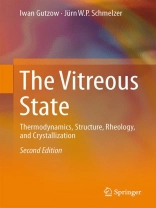This book summarizes the experimental evidence and modern classical and theoretical approaches in understanding the vitreous state, from structural problems, over equilibrium and non-equilibrium thermodynamics, to statistical physics. Glasses, and especially silicate glasses, are only the best known representatives of this particular physical state of matter. Other typical representatives include organic polymer glasses, and many other easily vitrifying organic and inorganic substances, technically important materials, amidst them vitreous water and vitrified aqueous solutions, and also many metallic alloy systems. Some of these systems only form glasses under particular conditions, e.g. through ultra-rapid cooling. This book describes the properties and the formation of both every-day technical glasses and especially of such more exotic forms of vitreous matter.
It is a unique source of knowledge and new ideas for materials scientists, engineers and researchers working on condensed matter. The new edition emphasizes latest experimental findings and modern theories, explaining the kinetics of glass formation, the relaxation and stabilization of glasses and their crystallization in terms of new models, derived from the framework of the thermodynamics of irreversible processes. It shows how the properties of common technical glasses, window glass, or the vitreous ice kernel of comets can be used to develop a new understanding of the existence of matter in various, unusual forms. The described theories can even find application for the description of lasers and interesting unusual processes in the universe.
विषयसूची
States of Aggregation, Thermodynamic Phases, and the Vitreous State.- Non-Equilibrium Thermodynamics and the Kinetics of Glass Transition and Stabilization.- General Approaches to the Description of the Structure of Glasses.- Statistical Physics of Under-Cooled Melts and Glasses.- Nucleation in Glass-Forming Systems.- Catalyzed Crystallization of Glass-Forming Melts.- Theory of Crystal Growth and Dissolution in Under-cooled Melts.- Growth of Clusters. Ostwald’s Rule of Stages.- Kinetics of Overall Crystallization.- Liquid Phase Separation in Glass-Forming Melts.- Rheology of Glass-Forming Melts.












